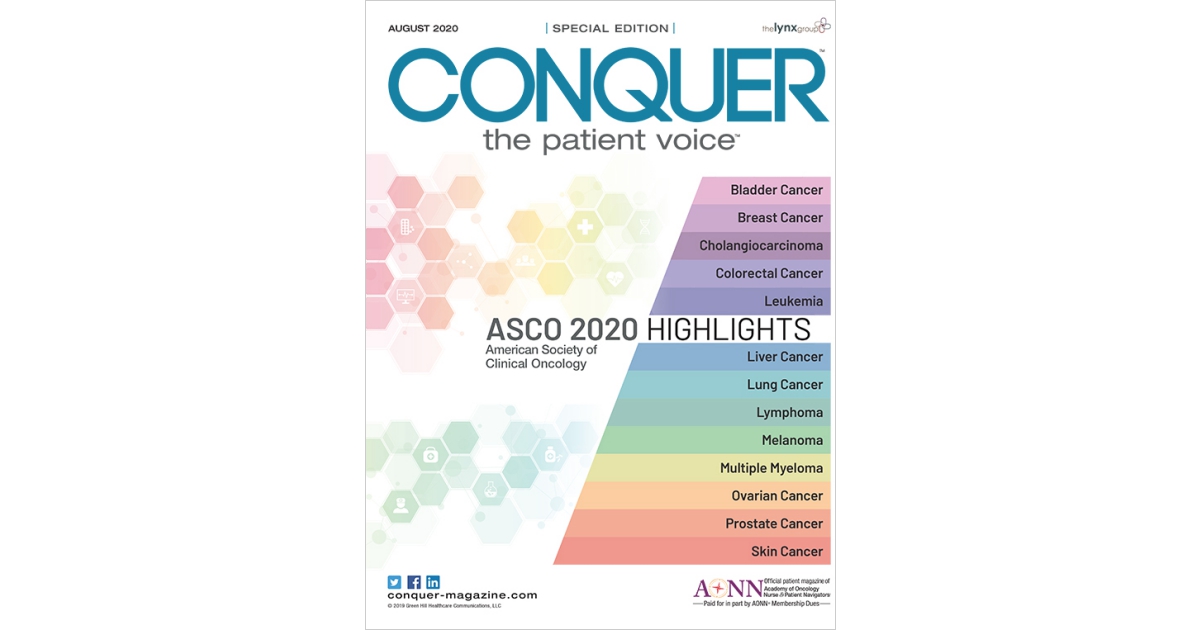ASCO 2020 Highlights

By Wayne Kuznar
A total of 80% of patients with relapsed (coming back) or refractory (not responding to therapy) slow-growing (indolent) non-Hodgkin lymphoma (NHL)—including patients with follicular lymphoma or marginal-zone lymphoma (MZL)—achieved a complete response (no sign of cancer) to Yescarta (axicabtagene ciloleucel), an anti-CD19 CAR T-cell therapy. Read More ›
By Phoebe Starr
Patients with extensive-stage small-cell lung cancer, a rare type of lung cancer, now have a new first-line treatment option with Imfinzi (durvalumab), a PD-L1 inhibitor, in combination with chemotherapy, according to new results presented at the 2020 ASCO annual meeting. This new combination has been shown to improve survival for these patients, who do not have many treatment options and whose prognosis (survival outlook) is less than 5 years. Read More ›
Patients with metastatic (spreading to other parts of the body) non–small-cell lung cancer who received the drug Tecentriq (atezolizumab) as a first-line therapy had improvements in physical functioning, without worsening of their lung cancer–related symptoms, compared with patients who received chemotherapy. Read More ›
By Chase Doyle
Zepzelca (lurbinectedin), a recently approved drug for patients with metastatic (spreading) small-cell lung cancer, may be even safer than expected, according to data from 2 studies presented at the 2020 ASCO annual meeting. Read More ›
By Wayne Kuznar
Treatment with the targeted drug Tagrisso (osimertinib) as an adjuvant therapy (used in addition to primary therapy, such as surgery or chemotherapy) significantly reduces disease recurrence in patients with localized non–small-cell lung cancer (NSCLC) and an EGFR gene mutation (alteration). Read More ›
The combination of Lenvima (lenvatinib), an oral kinase inhibitor, and the immunotherapy Keytruda (pembrolizumab), a PD-1 inhibitor, showed promising benefits for the treatment of patients with liver cancer (or hepatocellular carcinoma) that cannot be removed by surgery (unresectable). Read More ›
By Chase Doyle
Just because a cancer drug is approved by the FDA does not mean its therapeutic benefit is completely understood. Improving outcomes and minimizing side effects of a drug often requires using the drug in different doses or in combination with other drugs. Read More ›
This is a very special issue of CONQUER: the patient voice. Many of you may not know that on an annual basis, the largest oncology organization, the American Society of Clinical Oncology—better known as ASCO—is holding a conference to discuss the most recent findings in cancer research. Read More ›
The new cancer drug Tukysa (tucatinib), when given in combination with Herceptin (trastuzumab) and capecitabine, dramatically improved outcomes for patients with HER2-positive advanced breast cancer that has spread to the brain, according to data presented by Nancy U. Lin, MD, Associate Chief, Division of Breast Oncology, Dana-Farber Cancer Institute, Boston, MA, at the 2020 ASCO annual meeting. Read More ›
Metastatic breast cancer is cancer that has spread beyond the breast to other parts of the body. Visceral metastases refer to cancer that has spread to the internal organs of the body, specifically those within the chest (such as the heart or lungs) or abdomen (such as the liver, pancreas, or intestines). Read More ›














